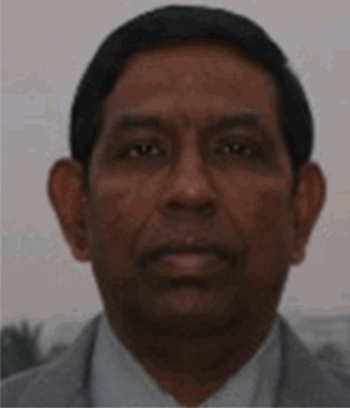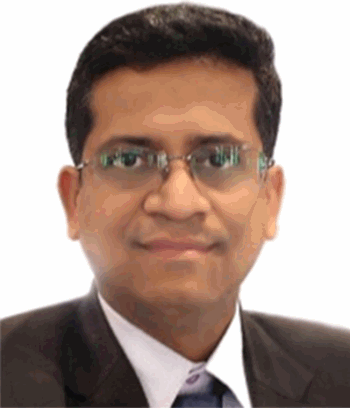In recent years there has been significant interest developed in establishing smart cities based on the Internet of Things (IoT) in both academia and industry. Smart cities can offer a variety of advanced applications such as smart banking, intelligent transportation, etc. to improve the living standards of citizens. One of the major challenges for the smart city is security.
The 64thAnnual IETE Convention (AIC)-2021 was aimed to bring together both novice and experienced scientists with developers, to meet new colleagues, generate new ideas and establish new cooperation between research groups and provide a platform for researchers from academic and industry to present their original work and exchange ideas, information, techniques, and applications in the field of Internet of Things (IoT) for Smart Cities and Societies with Applications.
AIC-2021 was organized by the Institution of Electronics & Telecommunication Engineers, India hosted by the IETE Kolkata Centre. This conference received 32 papers across the globe. This special issue part volume entitled “IoT, Sensor Networks and Blockchain Technology for Smart Cities and Societies” contains 10 full papers. Two tier reviews were conducted. In the first phase papers were selected for presentation based on peer review. After the presentation in the AIC 2021 presented papers were uploaded into the portal of the journal for further review. Based on this phase of review 10 papers are accepted for this special issue following the norms of the journal house.
The first paper is titled “A Hybrid Algorithm for Urban LULC Change Detection for Building Smart-city by Using World View Images”. In this proposed method a multiclass Support Vector Machine (SVM) and ISODATA-embedded large-scale change detection method has been used. This method can automatically segment, detect, and perform LULC change analysis.
The second paper is titled “A Smart City Air Quality Data Imputation Method using Markov Weights-Based Fuzzy Transfer Learning”. In this study, a fuzzy transfer learning-based imputation (FTLI) method is proposed for the smart imputation of missing air quality data. The central concept of this proposed method is to acquire knowledge through fuzzy inference systems (FISs) from other air quality monitoring systems called source domains where sufficient data is available.
The third paper in the issue is “A Novel Steganographic Approach for Secured Communication via Boustrophedon Transformation to Develop IoT Based Smart City”. This research is based on a pioneer steganographic approach introducing Image Authentication using Boustrophedon Transformation (IABT) to ensure secured communication in smart cities.
Fourth paper, entitled “Block-A-City: An Agricultural Application Framework using Blockchain for Next-Generation Smart Cities”, provides a promising approach with a unique strategy for converting conventional agriculture to smart agriculture, concerning smart cities, considering blockchain technology and the Internet of Things (IoT) features.
The fifth paper, entitled “Dew City Game: Dew Computing based 5G IoT for Smart City using Coalition Formation Game” deals with optimized dew enabled M2M communication network with ∼15% to 42% less delay and ∼20% to 50% less power consumption than nonoptimized dew enabled M2M communication and non M2M communication.
"IoT Based Condition Monitoring for Railway Track Fault Detection in Smart Cities" is the title of the following paper. The suggested work demonstrates maintenance i.e., condition monitoring based fault detection. The system can easily indicate the weak locations in the track that can be further, analyzed in detail by the diagnostician. Thus, the system aids in track maintenance strategies and will reduce downtime.
The seventh article is titled "Multimedia Authentication through Digital Tattooing Scheme at IoT Perception Layer for Smart City". The principle of this approach is to detect changed pixels using the Cyclic Redundancy Check (CRC) code. The CRC is a data integrity check that is both powerful and simple to use. It is the most used method of mistake detection in telecommunications.
In the following paper, entitled “Quality of Life Modeling with Invulnerable Social-IoT using Network Structural Entropy for Sustainable Smart City,” the proposed model for Quality of Life (QoL) signifies the careful coordination between the smart APIs and the underlying devices, which are vulnerable to heavy traffic, security attacks and technical snags. The empirical model, QoL, presents a technology-enabled quantitative measure to estimate the sustainability of the smart city with the help of device parameters.
The ninth paper is titled “Smart Mobile Device to Trace Moving Rogue Objects in Smart City Utilizing Dynamic Source Dynamic Destination Tracking Algorithm”. This device considers any two mobile objects to estimate the shortest path between them. The proposed Ant Colony Optimization (ACO) based algorithm considers the property of dead-end removal and nth path exploration with efficient self-loop removal strategy.
The tenth paper, entitled “Unique Video Encryption Technique Intended for Smart City Application,” primarily addresses the security needs for video content in IoT. Any video file can be considered as a collection of continuous images. This research article dealt with video encryption, fundamentally a multi-round key-based shuffling of collection of images, components of the original video file to be encrypted.
The organizers expresses their sincere gratitude to the immediate Past President Prof (Dr) J W Bakal and the then President of IETE Prof (Wg Cdr) P Prabhakar for their immense support for the 64th AIC 2021 and publication of the Special issue in the IETE Journal of Research. The organizers express their deep sense of gratitude to Prof M N Hoda, Past Chairman of TPPC. Our sincere gratitude to the present Chairman of TPPC Prof (Dr) M H Kori for his support and cooperation.The organizers also express sincere gratitude to Prof (Dr) A K Saini the Chairman Publication Committee and all past and present members of publication committee for their support and co-operation for this special issue.The editors also like to express deep sense of gratitude to all official member of IETE headquarter for their immense support in this regards.
We sincerely thank Zonal Mentor East Shri Ajay Kumar for his encouragement, insight, and helping to bring about this special issue.
Our sincere regards to all esteemed Governing Council members past and present for their immense support for publication of this special issue.
Our gratitude to Dr M H Kori, Vice President for his constant encouragement and support in various phases of the special issue. Our sincere regards to all reviewers for taking so much pain to review the papers multiple times. Thanks to esteemed authors for submitting papers for the 64th AIC 2021.
We would like to express our gratitude to the Editor-in-Chief, Professor Shiban K. Koul for his immense support for this special issue “IoT and Block Chain Technology for Smart Cities and Societies.”
Hope this issue will be a good material for researchers and engineers.
Additional information
Notes on contributors

Jyotsna Kumar Mandal
Jyotsna Kumar Mandal (F-232495) is former vice chancellor, Raiganj University, Raiganj, West Bengal. He received MTech in computer science from University of Calcutta in 1987, awarded PhD (Engineering) in computer science and engineering by Jadavpur University in 2000. Currently, he is a professor of computer science & engineering, University of Kalyani. He is a former dean, Faculty of Engineering, Technology & Management, KU for two consecutive terms during 2008-2012; former director, IQAC and former chairman CIRM Kalyani University. He served as professor, computer applications, Kalyani Government Engineering College for two years. He was the associate professor computer science for eight years at North Bengal University and assistant professor, computer science, North Bengal University for seven years. He also served as lecturer at NERIST, Itanagar for one year. He possesses over 35 years of teaching and research experience in coding theory, data and network security and authentication; remote sensing & GIS based applications, data compression, error correction, visual cryptography and steganography. He has awarded 30 PhD degrees and 8 scholars are still pursuing. He supervised 03 MPhil, more than 80 MTech and more than 130 MCA dissertations. He is the guest editor of MST Journal (SCI indexed) of Springer. Dr Mandal has published more than 450 research articles out of which 190 articles are in international journals; 12 books from Springer, LAP Germany, IGI Global etc. His latest published text book is on Reversible Steganography and Authentication via Transform Encoding from Springer (https://link.springer.com/book/10.1007/978-981-15-4397-5). He has organized 60 international conferences and is a corresponding editor for edited volumes and conference publications of Springer, IEEE and Elsevier, etc. As a volume editor, he has worked on sixty books so far. He has finished five research projects funded by the AICTE and the Government of West Bengal. He has led the CSI in both the Kolkata and Siliguri chapters, and he was the IETE Kolkata Centre secretary. He has status as an expert with the AICTE's Evaluation and Validation Committee and serves on the NAAC's Peer Team. He is involved in academic auditing at a number of different institutions. In 2018, he received the "Siksha Ratna" award for his exceptional contributions to the field of education from the Government of West Bengal in India. Email: [email protected]

Debashis De
Debashis De (F-502108) is a professor Department of Computer Science and Engineering at the Maulana Abul Kalam Azad University of Technology, West Bengal, India. He received MTech from the University of Calcutta, in 2002 and a PhD from Jadavpur University in 2005. He is Senior Member-IEEE, Fellow IETE, and Life member CSI. He was awarded the prestigious Boyscast Fellowship by the Department of Science and Technology, Government of India, to work at the Heriot-Watt University, Scotland, UK. He received the Endeavour Fellowship Award from 2008–2009 by DEST Australia to work at the University of Western Australia. He received the Young Scientist award both in 2005 at New Delhi and in 2011 in Istanbul, Turkey, from the International Union of Radio Science, Belgium. In 2016 he received the JC Bose research award from IETE, New Delhi. In 2019 he received Shiksha-Ratna Award from the Govt of West Bengal. He established the Center of Mobile Cloud Computing (CMCC) for IoT applications. He is Vice-chair of Dew Computing STC of the IEEE Computer Society. He published 375 journals and 200 conference papers, fifteen books, and filed ten patents. His h index is 42, the citation is 8000. He has supervised 20 PhD students. Listed in the Top 2% Scientist List of the world, Stanford University, USA. His research interest is mobile cloud computing, IoT, and quantum computing. He is chairman of IETE and CSI Kolkata chapter. Email: [email protected]
